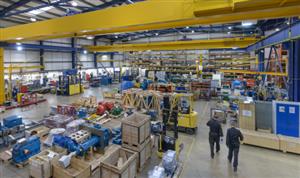
When we think about depreciation of an asset, we typically think about it based on a percentage, such as is used in tax accounting. But companies that have looked at equipment values over the years realize that a piece of machinery that has been fully depreciated on your taxes still has significant value in your business operation and can cost a lot of money to replace. In equipment appraisals, physical deterioration is a much more commonly used form of depreciation. Here's why:
How physical Deterioration is different than percentage-based depreciation
Because machinery varies so much in terms of lifespan, durability and reliability, it became much easier for the Internal Revenue Service to simply determine a set number of years over which a piece of equipment is appraised. But in reality, equipment that is well cared for may last many years, if not decades, beyond the point that it has been fully depreciated. By having a machinery valuation performed by a qualified equipment appraiser, you have a record of the equipment's actual value instead of what the IRS thinks it's worth.
Why physical Deterioration provides a better estimate of business assets
By comparison, a physical deterioration using the age/life ratio provides you with the best possible documentation that will hold up in financial, legal, insurance and tax office circles. If you need financing for your latest project, being able to prove the value of all your assets beyond what's listed on your tax return helps you secure it. If you're dealing with a legal headache, you can document the condition of your machinery, proving that its not, in fact, worthless as the other side may contest. If you suffer a serious loss in your business, whether due to a fire, natural disaster or vandalism, you can prove the equipment values of replacing the equipment through your insurance company without any doubt as to the accuracy of the report.
But what about the flip side of the coin? If your equipment is losing value faster than the IRS depreciation tables, a quality machine appraisal provides you with quality evidence that you need to depreciate it more quickly. This can also hold true in terms of property taxes, where you may end up having to appeal your tax assessment because of a high appraisal that was performed based on standardized depreciation rates. A proper equipment valuation provides legal documentation of the equipment's actual value, allowing you to have your taxes lowered based on the lower appraised value and lowering your overhead.
By keeping track of your actual machine values through a quality machine appraisal, it's much easier to document the replacement value when you need it most. If you haven't found a company to perform a quality machinery valuation on your equipment, you could be leaving money on the table when it comes time for insurance policy renewal, financing for a big project or expansion or a property tax appeal.

